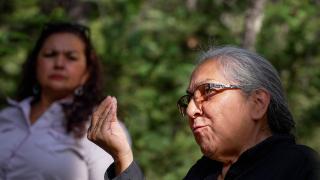Update your lexicon: Indigenous Knowledge replaces Native Knowledge

WASHINGTON, D.C.—The White House issued "Guidance for Federal Departments and Agencies on Indigenous Knowledge" in November 2022, which defined the term “Indigenous Knowledge” and instructed agencies to apply Indigenous Knowledge in decision-making, research and policies. In response to this guidance, the Forest Service land management planning regulations and directives team updated the rule (36 CFR 219) and directives in the Forest Service Handbook (FSH 1909.12 and FSH 1909.12 Chapter 40) to reflect Indigenous Knowledge as the official term.
Why the change?
The White House guidance, as a result of tribal consultation, notes that different tribal communities and individuals generally endorse Indigenous Knowledge as the most current and appropriate term for federal agencies to use.
Forest Service planning regulation (36 CFR 219) used the term “Native Knowledge” to describe this concept rather than Indigenous Knowledge. Meanwhile, other agencies used a range of different terms—sometimes causing confusion.
Indigenous Knowledge reflects updated terminology across agencies, but it will not alter how Forest Service land management planning is implemented. Responsible Forest Service officials already solicit and consider traditional, cultural, ecological and technical knowledge from the 574 federally recognized tribes and Alaska Native communities as a source of best available scientific information during land management planning projects. This aligns with the Forest Service Tribal Action Plan.
Using the term Indigenous Knowledge makes regulatory language across agencies more consistent and less confusing.
Updating directives and handbooks
Good news! Changes from using the outdated terms to using Indigenous Knowledge can be made through a relatively simple technical correction to the Forest Service regulations and an administrative issuance in the Directive System. There’s no need for public notice and comment or advance approval by the Office of Management and Budget.
So, check your local directives and make sure to use the new terminology, Indigenous Knowledge.
